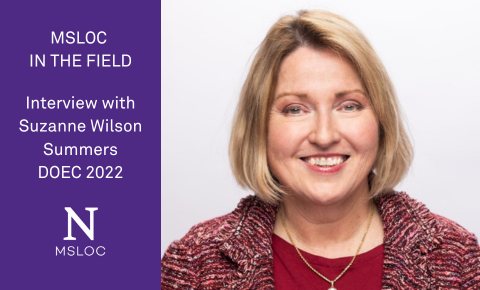DOEC in the Field: Suzanne Wilson Summers Advocates Empowering Individuals and Cultivating Collaboration for Effective Learning Solutions in Higher Education
 Our latest MSLOC community member profile with alum Suzanne Wilson Summers is based on a live interview conversation conducted via Zoom
Our latest MSLOC community member profile with alum Suzanne Wilson Summers is based on a live interview conversation conducted via Zoom
Please introduce yourself and share a little about your professional background before and after completing the Designing for Organizational Effectiveness Certificate (DOEC).
I'm Suzanne Wilson Summers and my career journey is a bit different than most in my cohort. For most of my professional life, I've worked in higher education, teaching US history at various institutions in Texas. However, my path took a turn when I participated in a leadership program sponsored by the American Council on Education, aimed at preparing future senior leaders. This experience ignited my passion for academic leadership, especially given the significant disruptions facing higher education even before the pandemic hit. I was seeking a program that could equip me with the tools and skills to facilitate meaningful change while offering me a window into how diverse industries are navigating similar issues, such as employee engagement.
That’s when I came across DOEC; It might seem like a circuitous journey, but it is exactly what I was looking for to support my professional journey. With a background in academia, as well as military service, I've long believed in the power of people and a commitment to service to bring about transformative change. Now, as I transition into a new role as Vice President for the Division of Learning at the College of Southern Maryland, I am eager to continue making a positive impact in higher education.
How has the Designing for Organizational Effectiveness Certificate (DOEC) influenced your career trajectory?
Let me share an example that illustrates how what I learned through DOEC has affected my career trajectory. In a previous role, I served as the Assistant Vice President for Teaching and Learning of the Ivy Tech Community College system. With 19 campuses in a state system, the challenge involved scaling learning across a matrixed network. My focus was on empowering faculty and program chairs to serve as effective champions of student success initiatives. Drawing from my experience and the insights gained from the program, I spearheaded comprehensive faculty development initiatives, including dedicated leadership programs for department chairs. My team and I prioritized engagement and feedback loops to ensure that faculty and chairs were active design partners in developing programs that met their needs. This collaborative approach, rooted in authentic engagement and iterative improvement, has been instrumental in driving meaningful change within higher education institutions. Currently, I’m working with the Gardner Institute, a national nonprofit dedicated to improving student outcomes, to design training for chairs and deans using a similar approach. DOEC equipped me with the language, concepts, and models to navigate complex organizational dynamics and to support a culture of continuous improvement.
How has being part of the community benefited you in terms of connections and/or collaborations?
Being part of the DOEC community has been immensely beneficial in terms of fostering connections and collaborations beyond the program itself. I'm fortunate to be in touch with several peers from my cohort, and we share our insights, experiences, and collaborative projects. For instance, we've discussed collaborative approaches to consulting and how to effectively meet clients' needs while respecting their expertise. Engaging with such creative peers has enriched my professional growth; particularly valuable is the chance to bounce ideas off each other, enhancing our individual approaches to challenges in our respective fields. Overall, the DOEC community's collaborative environment and hands-on learning approach have expanded my toolbox and continues to provide ongoing support.
What advice would you give to current or potential students pursuing the Designing for Organizational Effectiveness Certificate?
My advice for current and potential students pursuing their certificate is simple: just do it! Embrace the process of learning, even if the way forward may seem unclear or challenging. When we were new in the program, my cohort members and I sometimes experienced uncertainty, but wrestling with ambiguity while investigating new concepts is where true learning occurs. The faculty and staff are incredibly generous with their time and experience. Additionally, the program offers a unique environment for peer support and collaborative learning. Drawing from a wide range of professional experiences within my cohort, I found immense value in hearing diverse perspectives and approaches. Despite the inevitable challenges of balancing work and study, persevering through the program has been extremely rewarding. So, my advice is to hang in there, stay engaged, and embrace the opportunities for growth and learning that the program offers.